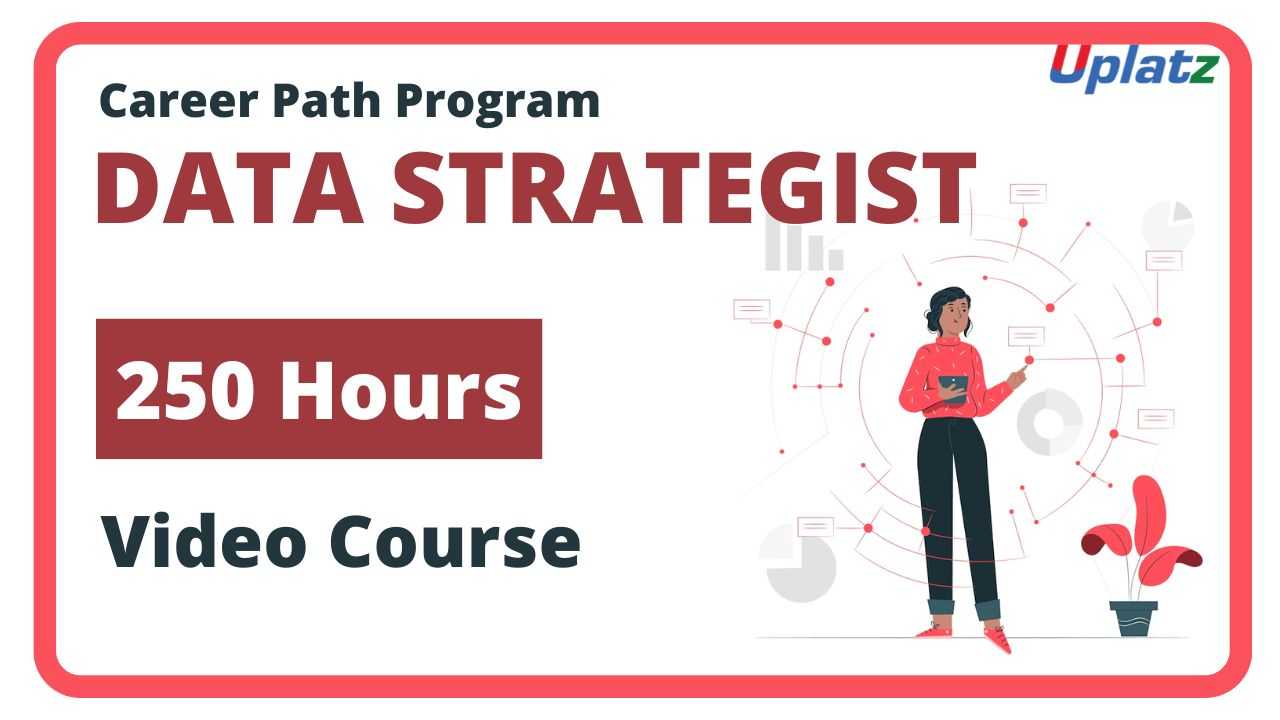Data Governance Manager Career Path
Lead enterprise data compliance, quality, and strategy with this comprehensive Data Governance Manager career development course View Course Curriculum
Price Match Guarantee
Full Lifetime Access
Access on any Device
Technical Support
Secure Checkout
Course Completion Certificate
View Course Curriculum
Price Match Guarantee
Full Lifetime Access
Access on any Device
Technical Support
Secure Checkout
Course Completion Certificate
 92% Started a new career
BUY THIS COURSE (
92% Started a new career
BUY THIS COURSE (USD 45 USD 139 )-
 87% Got a pay increase and promotion
87% Got a pay increase and promotion
Students also bought -
-

- Data Engineering with Talend
- 17 Hours
- USD 12
- 540 Learners
-

- Career Path - Data Engineer
- 100 Hours
- USD 45
- 1167 Learners
-

- Career Path - Data Strategist
- 250 Hours
- USD 45
- 1817 Learners

Data Governance Manager Career Path – Self-Paced Online Course
Step into the strategic world of enterprise data management with this in-depth, self-paced course designed for aspiring Data Governance Managers. This course provides comprehensive training on data governance principles, policies, frameworks, and tools that support regulatory compliance, data quality, metadata management, and enterprise-wide data stewardship.
As businesses evolve into data-centric organizations, managing data as a strategic asset has become essential. This course equips you with the skills to lead data governance initiatives, enforce compliance with global data regulations (GDPR, HIPAA, CCPA), and collaborate across departments to ensure the availability, usability, integrity, and security of data.
You’ll gain real-world insights and actionable knowledge through pre-recorded video sessions, expert case studies, and tool-based training to help you become a certified and impactful Data Governance Manager.
Oops! No Video Subscriptions
By the end of this course, learners will be able to:
- Understand data governance frameworks and roles within a governance program
- Define and enforce data policies, data ownership, and stewardship practices
- Implement data quality metrics and improvement strategies
- Ensure regulatory compliance with major data privacy laws (e.g., GDPR, HIPAA)
- Collaborate cross-functionally with legal, IT, analytics, and business units
- Manage metadata, master data, and data lineage documentation
- Apply data governance tools and platforms in enterprise environments
- Prepare for interviews, certifications, and leadership roles in data governance
Syllabus:
- Introduction to Data Governance
- Purpose and importance of data governance
- Roles and responsibilities in governance frameworks
- Data Policies, Standards & Stewardship
- Creating data policies and enforcing standards
- Data ownership and stewardship best practices
- Regulatory Compliance & Legal Frameworks
- Overview of GDPR, HIPAA, CCPA, and other regulations
- Risk management and audit trails
- Data Quality Management
- Measuring data quality and implementing improvement programs
- Tools for cleansing, validation, and quality reporting
- Metadata and Master Data Management (MDM)
- Introduction to metadata repositories
- MDM architecture and implementation
- Data Lineage and Cataloging
- Tracking data origins and transformations
- Implementing enterprise data catalogs
- Governance Tools & Technologies
- Introduction to Collibra, Informatica, Alation, and Microsoft Purview
- Tool selection, configuration, and application
- Cross-Functional Collaboration and Governance Culture
- Working with legal, IT, BI, and compliance teams
- Building a culture of data accountability and literacy
- Data Governance in AI, ML, and Cloud Environments
- Ethical AI governance, explainability, and fairness
- Managing governance across cloud data platforms
- Career Roadmap & Certification Prep
- Resume building and interview preparation
- Guidance for CDMP, DCAM, and other governance certifications
Upon successful completion of this course, learners will receive a Course Completion Certificate from Uplatz, confirming their expertise in data governance strategy, implementation, and compliance management.
This Uplatz certification can greatly enhance your credibility in the data governance domain and support your progression into senior data roles. It validates your ability to develop governance frameworks, lead compliance initiatives, and manage data policies in line with industry best practices.
The course also serves as strong preparation for globally recognized certifications such as CDMP (Certified Data Management Professional) or DCAM (Data Management Capability Assessment Model)—ideal for professionals seeking leadership roles in data governance, risk, and compliance.
The demand for Data Governance Managers is on the rise as organizations seek to protect sensitive information, ensure regulatory compliance, and maintain data integrity in an ever-evolving digital landscape.
Roles after completing this course include:
- Data Governance Manager
- Data Stewardship Lead
- Director of Data Management
- Regulatory Compliance Manager
- Chief Data Officer (CDO) (progression pathway)
Industries actively hiring:
Finance, healthcare, telecommunications, e-commerce, energy, government, and insurance sectors rely on governance experts to manage their data responsibly.
Career Progression:
With experience, learners can move into high-impact leadership roles such as:
- Chief Data Officer (CDO)
- VP of Data Strategy
- Director of Compliance and Risk
- AI Ethics and Governance Lead
- Data Transformation Consultant
Professionals can also transition into advisory or consulting positions, helping organizations implement governance frameworks, privacy programs, and compliance audits across digital and AI initiatives.
1. What is the role of a Data Governance Manager?
A Data Governance Manager defines and enforces data policies, ensures regulatory compliance, and maintains data quality and accountability across the organization.
2. How does data governance differ from data management?
Data governance focuses on policy, accountability, and compliance, while data management involves the day-to-day operations of collecting, storing, and using data.
3. What are the key components of a data governance framework?
Policies, roles, data standards, data stewardship, data quality, compliance controls, and performance metrics.
4. Why is data stewardship important?
It ensures that individuals take ownership of data quality and compliance within their functional areas, promoting responsible data handling.
5. What is metadata and why is it crucial for governance?
Metadata describes data characteristics and lineage, helping organizations track data origins, transformations, and usage.
6. How do you ensure data quality in a governance program?
By defining data quality metrics, conducting audits, establishing ownership, and leveraging tools for validation and cleansing.
7. Which tools are commonly used in data governance?
Popular tools include Collibra, Informatica, Alation, Talend Data Catalog, and Microsoft Purview.
8. What is GDPR and how does it affect data governance?
GDPR is a data privacy regulation that mandates strict controls on personal data handling; compliance is a key goal of governance frameworks.
9. How does data governance support AI and machine learning initiatives?
It ensures the training data is accurate, unbiased, and traceable, supporting ethical and reliable AI deployment.
10. What challenges might a Data Governance Manager face?
Resistance to change, data silos, lack of ownership, unclear roles, and integrating governance into fast-paced digital environments.
1. Who should enroll in this course?
Professionals in data management, compliance, legal, analytics, or IT roles looking to specialize in data governance.
2. Do I need a technical background?
Not necessarily. This course is designed for both technical and non-technical professionals.
3. Is the course self-paced?
Yes, you can learn at your own pace through pre-recorded videos and lifetime access to materials.
4. What kind of certificate will I receive?
You’ll receive a Course Completion Certificate from Uplatz upon successful completion.
5. Does this course prepare for governance certifications?
Yes, it provides a strong foundation for CDMP, DCAM, and similar professional certifications.
6. Will I learn about tools and software?
Yes, the course introduces top governance tools and explains how they are used in real organizations.
7. Are case studies included?
Absolutely. You’ll explore real-world governance scenarios from industries like healthcare, telecom, and finance.
8. Is support available during the course?
Yes, you’ll get expert guidance and access to a community forum.
9. Can I switch careers with this course?
Yes, it’s ideal for professionals transitioning from legal, analytics, or data management backgrounds into governance roles.
10. How long will I have access to the course?
You get lifetime access to all learning materials.









